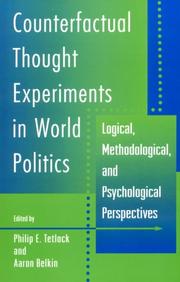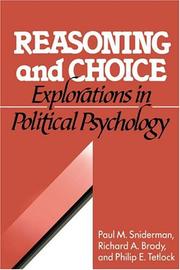| Listing 1 - 2 of 2 |
Sort by
|

ISBN: 0691027919 0691027927 0691215073 Year: 1996 Publisher: Princeton, N.J. Princeton University Press
Abstract | Keywords | Export | Availability | Bookmark
 Loading...
Loading...Choose an application
- Reference Manager
- EndNote
- RefWorks (Direct export to RefWorks)
Political scientists often ask themselves what might have been if history had unfolded differently: if Stalin had been ousted as General Party Secretary or if the United States had not dropped the bomb on Japan. Although scholars sometimes scoff at applying hypothetical reasoning to world politics, the contributors to this volume--including James Fearon, Richard Lebow, Margaret Levi, Bruce Russett, and Barry Weingast--find such counterfactual conjectures not only useful, but necessary for drawing causal inferences from historical data. Given the importance of counterfactuals, it is perhaps surprising that we lack standards for evaluating them. To fill this gap, Philip Tetlock and Aaron Belkin propose a set of criteria for distinguishing plausible from implausible counterfactual conjectures across a wide range of applications. The contributors to this volume make use of these and other criteria to evaluate counterfactuals that emerge in diverse methodological contexts including comparative case studies, game theory, and statistical analysis. Taken together, these essays go a long way toward establishing a more nuanced and rigorous framework for assessing counterfactual arguments about world politics in particular and about the social sciences more broadly.
International relations. Foreign policy --- Methods in social research (general) --- History as a science --- World politics. --- History --- Counterfactuals (Logic) --- Thought experiments. --- Philosophy. --- World politics --- -Counterfactuals (Logic) --- Thought experiments --- #SBIB:327H03 --- #SBIB:327.1H10 --- Experiments, Thought --- Methodology --- Contrary-to-fact conditional --- Counterfactual conditionals --- Conditionals (Logic) --- Logic --- Annals --- Auxiliary sciences of history --- Colonialism --- Global politics --- International politics --- Political history --- Political science --- World history --- Eastern question --- Geopolitics --- International organization --- International relations --- Philosophy --- Internationale betrekkingen: onderwijs en onderzoek --- Internationale betrekkingen: theorieën --- Counterfactuals (Logic). --- History, Modern --- Gedankenexperiment --- Internationale Politik --- Weltpolitik --- Azerbaijan crisis. --- Bay of Pigs. --- Goldstone, Jack. --- Halifax, Lord. --- Iranian revolution. --- Jowitt, Ken. --- Khrushchev, N. --- Leninism. --- Napoleon. --- Nash equilibrium. --- Qavam. --- Riser, E. --- Russian revolution. --- Stalinism. --- Thucydides. --- data scarcity. --- experimental method. --- hindsight. --- legitimacy issues. --- moral catastrophes. --- nomothetic counterfactuals. --- optimality constraints. --- perfect equilibrium. --- policy makers. --- proximity criterion. --- reification. --- structuralism. --- tripolar world. --- Politique mondiale --- Histoire --- Contrefactuel (logique) --- Pensée --- philosophie --- expériences --- Weltordnungspolitik --- Politik --- Internationale Beziehungen --- Politische Beziehungen --- Zwischenstaatliche Beziehungen --- Außenpolitik --- Internationales politisches System --- Experiment --- Pensée --- expériences

ISBN: 0521402557 0521407702 0511720467 0511878842 Year: 1993 Publisher: Cambridge Cambridge University Press
Abstract | Keywords | Export | Availability | Bookmark
 Loading...
Loading...Choose an application
- Reference Manager
- EndNote
- RefWorks (Direct export to RefWorks)
Drawing on a multitude of data sets and building on analyses carried out over more than a decade, this book offers a major new theoretical explanation of how ordinary citizens figure out what they favour and oppose politically. Reacting against the conventional wisdom, which stresses how little attention the general public pays to political issues and the lack of consistency in their opinions, the studies presented in this book redirect attention to the processes of reasoning that can be discerned when people are confronted with choices about political issues. These studies demonstrate that ordinary people are in fact capable of reasoning dependably about political issues by the use of judgmental heuristics, even if they have only a limited knowledge of politics and of specific issues.
Attitudes politiques --- Collectief gedrag in de politiek --- Comportement politique --- Conscience politique --- Identité politique --- Mass political behavior --- Massa -- Politiek gedrag --- Massapsychologie en politiek --- Political behavior --- Political psychology --- Political science -- Psychological aspects --- Politics [Practical ] -- Psychological aspects --- Politiek -- Psychologische aspecten --- Politiek bewustzijn --- Politiek en massapsychologie --- Politiek en psychoanalyse --- Politiek gedrag --- Politieke attitudes --- Politieke identiteit --- Politieke psychologie --- Politieke wetenschap -- Psychologische aspecten --- Politique -- Aspects psychologiques --- Politique -- Comportement collectif --- Politique et psychanalyse --- Psychanalyse et politique --- Psychoanalyse en politiek --- Psychologie [Politieke ] --- Psychologie politique --- Psychology [Political ] --- Psychopolitique --- Science politique -- Aspects psychologiques --- 32.01 --- Public opinion --- -#SBIB:324H20 --- Opinion, Public --- Perception, Public --- Popular opinion --- Public perception --- Public perceptions --- Judgment --- Social psychology --- Attitude (Psychology) --- Focus groups --- Reputation --- Political science --- Politics, Practical --- Psychology, Political --- Psychology --- Politicologie --- Politologie: theorieën (democratie, comparatieve studieën….) --- Psychological aspects --- Political psychology. --- 32.01 Politicologie --- #SBIB:324H20 --- Political sociology --- Opinion publique --- United States --- Public opinion - United States. --- Social Sciences --- Political Science
| Listing 1 - 2 of 2 |
Sort by
|

 Search
Search Feedback
Feedback About UniCat
About UniCat  Help
Help News
News